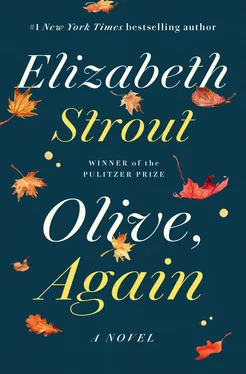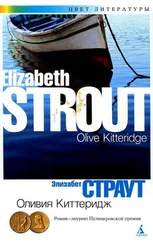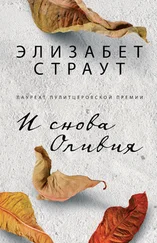The big man next to her kept turning toward his girlfriend, so his fat back was in Olive’s space. She heard their conversation in bits and pieces, and she recognized early on that the man was a bully, he was bullying his young girlfriend. She thought they were disgusting. “This is what you should be listening to,” the man said, and he repeated that many times. As though the girl had poor taste in music. And then the man whispered in his girlfriend’s ear, and the girl leaned forward slightly to look at Olive. They were talking about her! She, with her knees bent up, unable to straighten her legs, an old woman— What in the world did they have to say about her? The Asian girl gave a little shrug and Olive heard her say, “Well, that’s her life.” Whose life? What did that girl know about Olive’s life? Oh, she was fit to be tied, and she did not sleep a wink the whole flight over. At one point Jack stepped through the curtain dividing the cabin and said to her, “Well, hello, Olive! How’s it going?”
“I want my bag,” she told him. “If you could please get me my bag.”
He got her bag from the overhead bin, placed it in her lap, whispered in her ear, “There, there, little miss.”
“Go away, Jack,” she said. And she saw the big man beside her watching her. She closed her eyes, and kept them closed; the flight was absolutely endless.
But as they went through customs Jack was kind to her. He said, “Let’s get you to the hotel and get you some sleep.” He kept his eye on her as they moved through the line. At the hotel she fell asleep immediately, and they boarded the boat the next day.
When he became sad a few days later, she felt terrible—and frightened. She thought he missed his wife (even though Olive was his wife). She thought she was all wrong for him. Finally, she said, “Jack, I think I’m not a good wife for you—” He looked at her with surprise; she could see his surprise at what she said. “Olive, you’re actually the perfect wife for me. You really are.” He smiled and reached for her hand. “I’m just homesick,” he said. “All this goddamn beauty—” Tossing his head toward the window of their cabin. “It makes me miss the coast of Maine.”
“I miss the coast of Maine too,” she said. And after that they were fine. They had a wonderful time.
The last night on the boat, he said, “Oh, Olive, I got you a first-class ticket for the way home. Hope you don’t mind.” He winked at her.
And she could not believe the flight home. She had her own seat that stretched backward and forward. It was like she was an astronaut, in her own little cubbyhole. There was a kit, with socks and a mask and a toothbrush, all for her! She ate a roast beef sandwich and had ice cream for dessert, and she could not stop looking across the aisle at Jack. He made a kissing sound and said, “Now, don’t disturb me.” And drank his glass of wine.
The second week of October, Olive went to get her hair cut by Janice Tucker, a woman who worked from her home. Olive always had the first appointment of the day, at eight o’clock, and as she settled into her chair, Janice wrapped the plastic apron around her and said, “I heard you had breakfast with Andrea L’Rieux.”
“I did,” said Olive. “I certainly did.”
“Then you must feel terrible about her accident.”
“What did you say?” Olive turned her head.
“In the paper just yesterday. I thought you’d have seen it. Wait, I’ll get it for you.” Janice turned around and went through a pile of newspapers on the table in the waiting area. She brought back the paper and said, “Here. Look at this. Oh, Olive, I thought you knew.”
The small headline read: Former Poet Laureate Struck by Bus, Survives. And a small paragraph said that Andrea L’Rieux had been hit by a bus on a street in Boston, that she was in stable condition with a broken pelvis and internal injuries. A complete recovery was expected.
Olive felt a secretion from the back corners of her mouth. She put the paper on the counter and sat back and said nothing, while Janice got her little scissors and began to snip at Olive’s hair. “So sad, right?” Janice asked, and Olive nodded. She felt awful. As the woman snipped tenderly at her hair, Olive felt worse and worse. And then realizing she had no Jack—or Henry, her first husband—to go home and tell this to, she said suddenly, “Janice, I think the girl was trying to kill herself.”
Janice stood back, the scissors near her chest. “Olive, stop.”
“No, I think she was. I’ve been sitting here thinking about it, and she talked about suicide to me. She said how men use guns and women tend not to use guns, they mostly use pills, and I should have known, I should have realized—”
“Now, Olive. Don’t you think that. Do not even think that. I’m sure it’s not true. She was hit by a bus, it happens, Olive.”
“Janice, you didn’t see her. She looked like hell. She wore a ratty little sweater, and she was smoking. She hated her father, and then he died. And that can make a person messed up too.”
Janice seemed to think about this. And then she said, “Olive, I just don’t believe that she tried to kill herself. I don’t want to believe it, and so I’m not going to.”
“Fine,” said Olive. “Fine, fine, fine.”
She did not tip Janice, as she usually did, and then she left, waving one hand above her shoulder as she went down the steps with her cane.
It was a glorious autumn. The leaves clung to the trees and were more vivid than they had been in years. People said this to one another, and it was true. And the sun shone down on all of it, day after day. It rained mostly at night, and the nights were cold, and the days were not too cold, but they were not warm. The world sparkled, and the yellows and reds, and orange and pale pinks, were just splendid for anyone driving down the road out to the bay. Olive could see this without driving; from her front door she saw the woods, and every morning when she opened the door she was aware of the beauty of the world.
This surprised her. When her first husband had died, she had not been aware of anything. This is what she thought. But here was the world, screeching its beauty at her day after day, and she felt grateful for it. Inside the front closet, Jack’s coats and sweaters remained. And this was different too. She had gotten rid of Henry’s clothes quickly, once he died. She had even started getting rid of them while he was still in the nursing home, the new pair of shoes he had on the day of his stroke, that he would never wear again—she had gotten rid of those quick as a flash. Camel-hair-colored suede shoes, the laces not yet dirty a bit.
But Jack’s clothes she held on to, and the smell of them still arrived faintly when she opened the closet. There was the dark green cardigan with the leather elbow patches he wore when they went to dinner the first time, and the blue gabled one from when they’d had their first real fight and he had said, “God, Olive, you’re a difficult woman. You are such a goddamn difficult woman, and fuck all, I love you. So if you don’t mind, Olive, maybe you could be a little less Olive with me, even if it means being a little more Olive with others. Because I love you, and we don’t have much time.”
She’d heard him.
And then he’d said, sitting on the bed, “Let’s get married, Olive. Sell the house you had with Henry and move in here. Please marry me, Olive.”
Читать дальше













